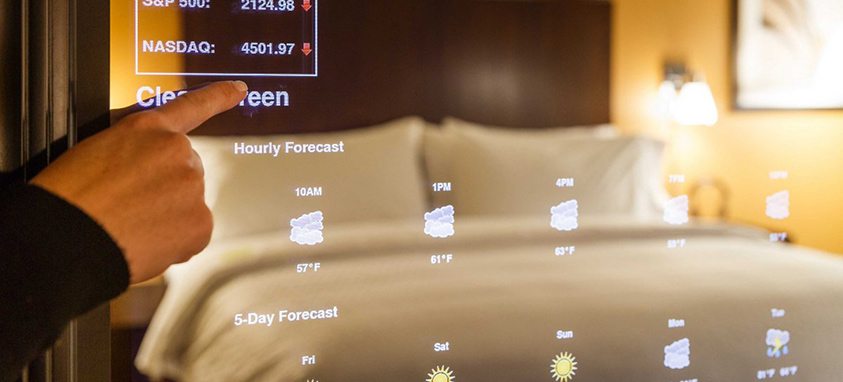The hospitality industry is continuously evolving, and technology has played a significant role in its transformation. The article discusses the future of hospitality technology and how it will impact the industry’s operations and customer experience.
The hospitality industry has come a long way from its traditional methods to adopt technological advancements in its operations. From booking and reservations to the management of food and beverage, technology has played a crucial role in enhancing the customer experience and streamlining the overall operations of the industry.
As we move toward the future, technology continues to play a significant role in shaping the hospitality industry’s operations and services. The future of hospitality technology is promising, with new technologies and innovations emerging to cater to the industry’s ever-growing needs.
From Artificial Intelligence (AI) and the Internet of Things (IoT) to Virtual Reality (VR) and Augmented Reality (AR), hospitality technology is moving towards offering a personalized and immersive experience to guests.
Smart Hotels

The concept of Smart Hotels is gaining popularity, and the future of hospitality technology lies in creating a connected ecosystem of devices and services. Smart Hotels integrate IoT-enabled devices to streamline hotel operations and offer a personalized experience to guests.
IoT-enabled devices such as smart locks, thermostats, and lighting systems allow guests to control the ambiance of their rooms through their smartphones. Additionally, AI-powered chatbots and voice assistants provide 24/7 customer support, helping guests with their queries and requests.
Personalization
Personalization is a crucial aspect of hospitality, and technology plays a vital role in providing a personalized experience to guests. The future of hospitality technology lies in AI-powered algorithms that analyze guests’ data and preferences to offer personalized services.
For instance, AI-powered chatbots can suggest personalized recommendations for food, drinks, and activities based on guests’ preferences and past behavior.
Robotics and Automation
Robotics and automation are the future of the hospitality industry. Robots and automated systems are already in use in several hotels and restaurants for tasks such as cleaning and food preparation.
The future of hospitality technology lies in developing more sophisticated robots that can perform a wide range of tasks, from handling luggage to delivering room service.
Additionally, automated systems such as self-check-in and self-check-out kiosks are becoming increasingly popular, allowing guests to avoid long queues and save time.
Virtual and Augmented Reality
Virtual and Augmented Reality technologies offer an immersive experience to guests, enhancing the overall hospitality experience. The future of hospitality technology lies in using VR and AR to offer guests a virtual tour of the hotel, its facilities, and its surroundings.
VR and AR can also be used to offer guests a personalized experience, such as a virtual reality tour of a destination they plan to visit or an augmented reality menu that allows guests to see the dish before they order it.
Contactless Technology
The COVID-19 pandemic has accelerated the adoption of contactless technology in the hospitality industry. Contactless technology such as QR code menus, digital payment systems, and keyless entry systems have become essential in ensuring guests’ safety and reducing the spread of the virus.
The future of hospitality technology lies in developing more sophisticated contactless technology, such as facial recognition systems that allow guests to check in without touching any surface.
Energy Efficiency
The hospitality industry is one of the most energy-intensive industries, and technology can play a vital role in reducing its carbon footprint. The future of hospitality technology lies in developing energy-efficient systems such as smart lighting and HVAC systems that can adjust to guests’ needs and preferences. Additionally, renewable energy sources such as solar panels and wind turbines can be used to power hotels and resorts, reducing their dependence on fossil fuels.
Data Analytics
Data analytics is becoming increasingly important in the hospitality industry, and the future of hospitality technology lies in using data analytics to gain insights into guests’ behavior and preferences.
Data analytics can be used to track guests’ spending patterns, preferences for food and beverages, and their feedback on the overall experience.
This data can be used to improve the overall guest experience, identify trends and patterns, and make data-driven decisions to optimize operations and increase revenue.
Cybersecurity
With the increasing use of technology in the hospitality industry, cybersecurity has become a major concern.
Hotels and resorts store sensitive information such as guests’ personal details, payment information, and booking information, making them a prime target for cyber-attacks.
The future of hospitality technology lies in developing sophisticated cybersecurity systems to protect guests’ data and ensure their privacy.
Collaborative Technology

Collaborative technology is becoming increasingly important in the hospitality industry, as it enables collaboration and communication between staff members and guests.
Collaboration technology such as video conferencing and messaging apps can be used to provide 24/7 customer support, enabling staff members to respond to guests’ queries and requests in real time.
Additionally, collaborative technology can be used to offer virtual meetings and events, making it easier for guests to attend meetings and events from remote locations.
Conclusion
The future of hospitality technology is promising, with new technologies and innovations emerging to enhance the overall guest experience and streamline hotel operations.
Smart Hotels, Personalization, Robotics and Automation, Virtual and Augmented Reality, Contactless Technology, Energy Efficiency, Data Analytics, Cybersecurity, and Collaborative Technology are some of the key areas where hospitality technology is making significant progress.
As the industry continues to evolve, technology will play a crucial role in shaping its future, offering a personalized and immersive experience to guests while streamlining hotel operations and increasing revenue.

























